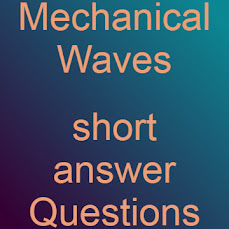ans:
2. Do sound waves need a medium to travel from one point to other in space? What properties of the medium are relevant?
ans:
3. Although the density of solid is high, the velocity of sound is greater in solid, explain?
ans:
4. Explain why the flash of light reaches the earth before the sound coming from the same thunder.
ans:
5. What discrepancy was there in Newton's formula for the velocity of sound in the air?
6. What is laplace correction in the velocity of sound? Why was it necessary?
7. Explain why the velocity of sound in solids is greater than that in gases, though the densities of solid are greater than that of gases.
8. A person walking on a railway line hears two sounds for the same explosion occuring far away, why?
9. When a person hammers at one end of a metal pipe and a listener places his ear at the other end. two distinct sounds are heard. Why?
ans:
10. When two persons sitting in a boat or ship talk with each other sounds can be heard over long distances why?
11. When an explosion occurs at a distance, the sound is heard many times and for longer time why?
12. What causes the rolling sound of thunder?
13. Velocity of sound increases in a cloudy day why?
14. Velocity of sound in hydrogen is greater than that in oxygen why?
15. Does the velocity of sound in a gas depend upon the atomicity of gas?
16. What is the effect of frequency or wavelength on the velocity of sound?
ans: The velocity of sound doesn't depend on the frequency.
17. Why does sound travel faster on a rainy day than on a dry day?
or
Is velocity of sound more in damp air or dry air?
18. Why sound made at a distance can be heard distinctly at night than at day time?
19. Do sound waves need a medium to travel from one point to other point in space? What properties of the medium are relevent?
20. Why do the stages of large auditoriums have curved backs?
21. Differentiate between forced vibration and free vibration?
ans:
22. What do you mean by resonance?
23. What are shock waves?
ans:
24. Point out the difference between damped and un-damped oscillations.
25. Why is some degree of reverberation considered useful?
26. When sound waves travel through a medium, does the temperature at various points remain constant? Explain.
27. By what factor does the velocity of transverse wave in string change when the tension is increased by four times?
ans:
Thank you very much for reading.
Best of luck for your exams.


































0 Comments